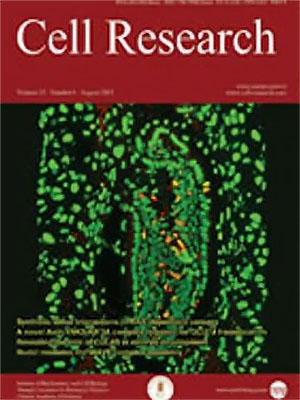
Volume 12, No 5-6, Dec 2002
ISSN: 1001-0602
EISSN: 1748-7838 2018
impact factor 17.848*
(Clarivate Analytics, 2019)
Volume 12 Issue 5-6, December 2002: 385-394
ORIGINAL ARTICLES
Developmental changes in functional expression and β-adrenergic regulation of If in the heart of mouse embryo
Gui Li SONG1, Ming TANG1,*, Chang Jin LIU1, Hong Yan LUO1, Hua Min LIANG1, Xin Wu HU1, JiaoYa XI1, Lin Lin GAO1, Bernd FLEISCHMANN2, Jürgen HESCHELER2
1Department of Physiology, Tongji Medical College of Huazhong University of Science and Technology, Wuhan 430030, China
2Institute of Neurophysiology, University of Cologne, D-50931 Cologne, Germany
Correspondence: Ming TANG(tangming49@hotmail.com )
The hyperpolarization-activated current (I
f) plays an important role in determining the spontaneous rate of cardiac pacemaker cells. The automatic rhythmicity also exists in working cells of embryonic heart, therefore we studied developmental changes in functional expression and
b-adrenergic regulation of I
f in embryonic mouse heart. The expression of I
f is high in early developmental stage (EDS) (10.5 d after coitus) ventricular myocytes, low in intermediate developmental stage (IDS) (13.5 d) atrial or ventricular myocytes and even lower in late developmental stage (LDS) (16.5 d) atrial or ventricular myocytes, indicating that these cells of the EDS embryonic heart have some properties of pacemaker cells.
b-adrenergic agonist isoproterenol (ISO) stimulates I
f in LDS but not in EDS cardiomyocytes, indicating that the
b-adrenergic regulation of I
f is not mature in EDS embryonic heart. But forskolin (a direct activator of adenylate cyclase) and 8-Br-cAMP (a membrane-permeable analogue of cAMP) increase the amplitude of I
f in EDS cells, indicating that adenylate cyclase and cAMP function fairly well at early stage of development. Furthermore, the results demonstrate that I
f is modulated by phosphorylation via cAMP dependent PKA both in EDS and LDS cells.
FULL TEXT | PDF
Browse 2433


